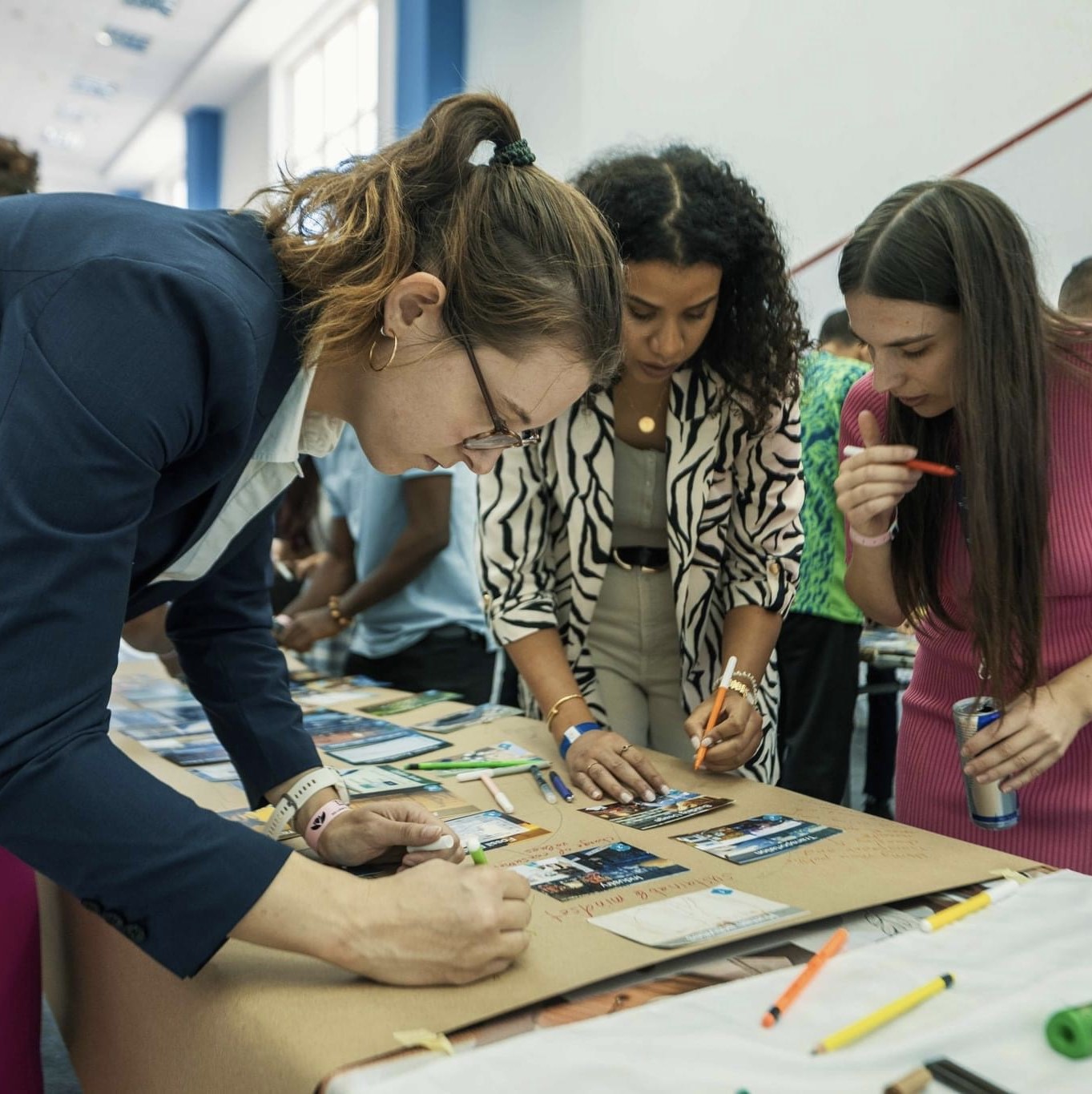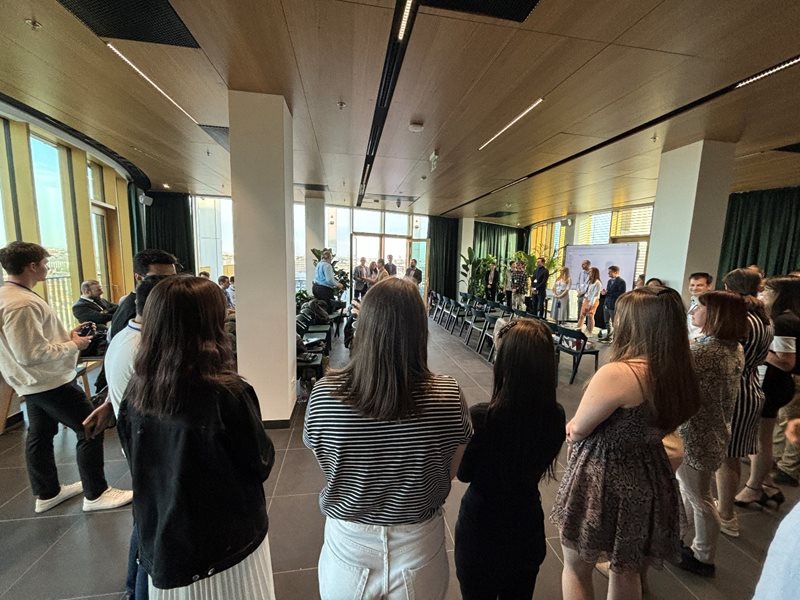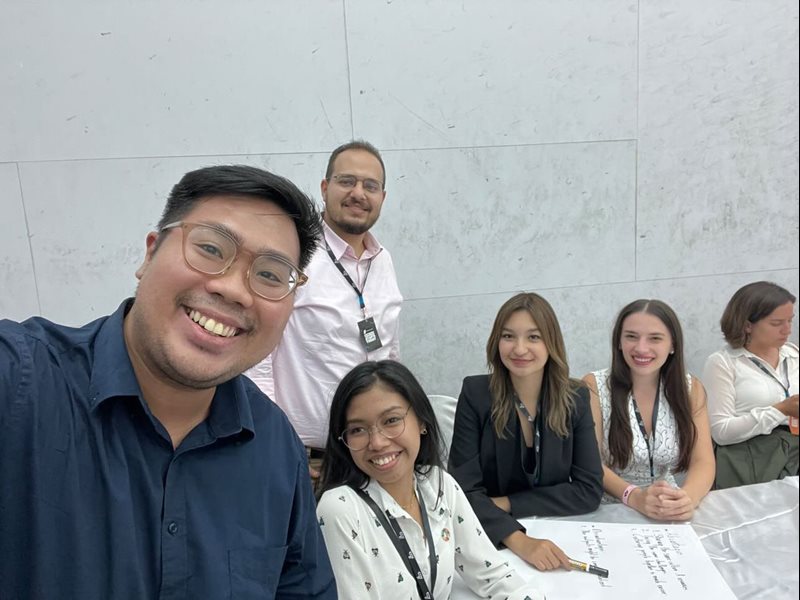How can someone from Corvinus become the sustainability leader of the future?

From a CSR course at university, through a training course at the University of Helsinki, all the way to the COY17 youth sustainability conference: We talked to Lili Anna Halász, a student of Commerce and Marketing at Corvinus, about how sustainability has shaped her career, what her experience of the COY17 conference in Egypt was like, what the climate fresk method is good for, and also asked her about her expectations for the Masdar Future Sustainability Leaders programme starting in Abu Dhabi this spring.
- Seizing the opportunity
Lili’s story started in a second-year CSR course. “I really liked the topic and the way Katalin Ásványi made the class interactive, allowing us to express our opinions” she says. “When the course was over, I went up to the lecturer and said that I was very interested in this topic and would like to write a TDK paper on it.”
After the inquiry, she didn’t have to wait long for her first opportunity. Next semester, some students from Corvinus University were able to participate in Climate University’s online international sustainability course, thanks to Katalin Ásványi, one of the course instructors. “For each class, I had to read almost 40 pages of scientific articles, which gave me a strong foundation to position myself in the field of sustainability,” says Lili.
She then took part in two start-up courses, HSUP and the Future Founders programme, the latter leading to an EU training programme on creative start-ups in Bucharest. It was here that she was offered the opportunity to attend a UN youth climate conference. “I submitted my TDK proposal that night, and ten days before the conference, I got an email saying I could go.”
The tight deadline made things difficult. “I immediately wrote to the lecturer to ask what to do now, because obviously the flight was very expensive ten days before departure. In the end, the university, thanks to Vice-Rector Réka Vas, financed my accommodation and participation in the conference, and I was able to represent the country and the university,” – says Lili, who was the only one representing Hungary at the conference.

- The wild problem
The youth conference in Egypt aimed to produce a sixty-page youth declaration for the COP27 conference the following week. “It was a several-hour long event where we worked in groups, contributing to the declaration from many angles,” says Lili. “One of the main themes was climate justice, based on the idea that developed countries are the biggest polluters, yet it is the less developed countries that suffer the most damage.”
The conference was a great experience for Lili and she still keeps in touch with many of the participants. “Almost the whole world was there, it was all young participants. There were also presentations during which we learned a lot,” she says. During one of these trainings the participants learned the Climate Fresk methodology, which is what Lili brought back from the conference.
Climate Fresk is a playful workshop that teaches participants about climate change in 3 hours. The workshop is accessible to anyone and can be quickly scaled up within an organisation or community. With 42 cards, players can learn about the fundamental problems of climate change and how they can be part of the fight against it.
The workshop also inspired Lili. “The reason why climate change is so difficult to solve is that the academic literature says it is a wicked problem, meaning that it is a complicated, “wild” problem. It has so many components and everything affects everything, so it’s very difficult to understand all the details,” she says. The concept of the workshop was created by engineer, public speaker and energy transformation consultant Cédric Ringenbach, and Lili says it works very well for all ages. “In three hours, the participants themselves can find out what the main drivers of climate change are and where they are starting from and where they are going”.
The workshop has three parts. The first one is similar to an escape room, where the participants have to guess the answer, with the facilitator only being present as a helper. The second part is about creativity, using cards to make a painting that participants can colour in and write down different solutions. This will help relieve tension and may also reduce climate anxiety. The third part is reflection, where the lessons are discussed together.
- Commitment and enthusiasm
Lili started to use the methods she learned at the conference when she returned home. The Climate Fresk workshop was presented at Corvinus, in two sustainability courses in the autumn semester. “The students really enjoyed it, the problem was clear to them this way. We played twice, once with Hungarian master students and once with international master students, and I felt at the end of the session that there were some takeaways. Hopefully, in the longer term, it can bring about a change in their attitude, or even lead to a deeper understanding of the issue later on”.
Of course, the role of facilitator also requires a good attitude, which Lili has been developing in her previous projects. As a student, “I taught high school students in the Studium Generale student association for three years, which is why I can now face the students when I do a workshop”.
Besides facing them, retaining their attention is another challenge in this role. “Sustaining enthusiasm in the long run can be very demanding, but it gives back a lot in return. I think it’s the teachers who can really appreciate this, you have to really inspire the participants during the session. You’re doing it, well done, keep it up.”
And sometimes the conversation needs to be facilitated to ensure that climate anxiety does not paralyse the capacity to act. “During the sessions, there are some tables that require less assistance, while others go into a doomsday mood and need to be pulled up a bit. You have to pay a lot of attention to the atmosphere, so that the participants are left with a positive experience after the session,” says Lili.

- Can a workshop change the world?
Many people can be influenced through the workshop, but the question arises as to what this is enough for when it comes to the global challenges of climate change.
“We are on a journey, but the world is not at the level where it should be. The biggest polluters are still not taking the steps they should for a sustainable future,” says Lili. “Nevertheless, it’s fantastic that here at the university they support this direction and that students have the opportunity to participate in similar projects, even in a workshop like this.”
According to Lili, these initiatives are also important because they give strength and hope to the participants. “Whether it was the university courses or the conferences, there was hope in everyone that we could change this, that we could turn it around, and that our generation could be the change.”
For example, their fresk at the conference was entitled “Climate is changing, so are we”. We are resilient and adaptive, so there is hope that this can be reversed.
- Continuing on the road ahead
This hope further inspires Lili to continue along the journey she has started. Nominated by the university, she is already participating in the Masdar Future Sustainability Leaders programme this year, with its first week held in Abu Dhabi. “During the programme, they hopefully prepare me to go to a company or any organisation in a way that I can lead significant sustainability changes there,” she says.
They will also meet with various regulators and sustainable companies, so this will be the next step for them. “I would definitely like to do this in the long term, either with a company or by starting my own sustainability startup.” And with the workshop, she is constantly travelling to companies and universities to help as many people as possible to see the problem and find possible solutions.
For those entering a similar field, the message is that the opportunities are there, but we have to make sure they find us. “Throughout my career so far, the attitude of constantly looking for opportunities has helped me a lot. Obviously, sometimes you have to take health breaks, but if you are interested in something, just go and talk to the lecturer. You can also look online, there are lots of free courses on sustainability, but the university is also very helpful.”
“And when I find an opportunity, I don’t look for reasons not to do it, I just take it and do it. A smooth sea does not make a skilled sailor, and I believe in that.”